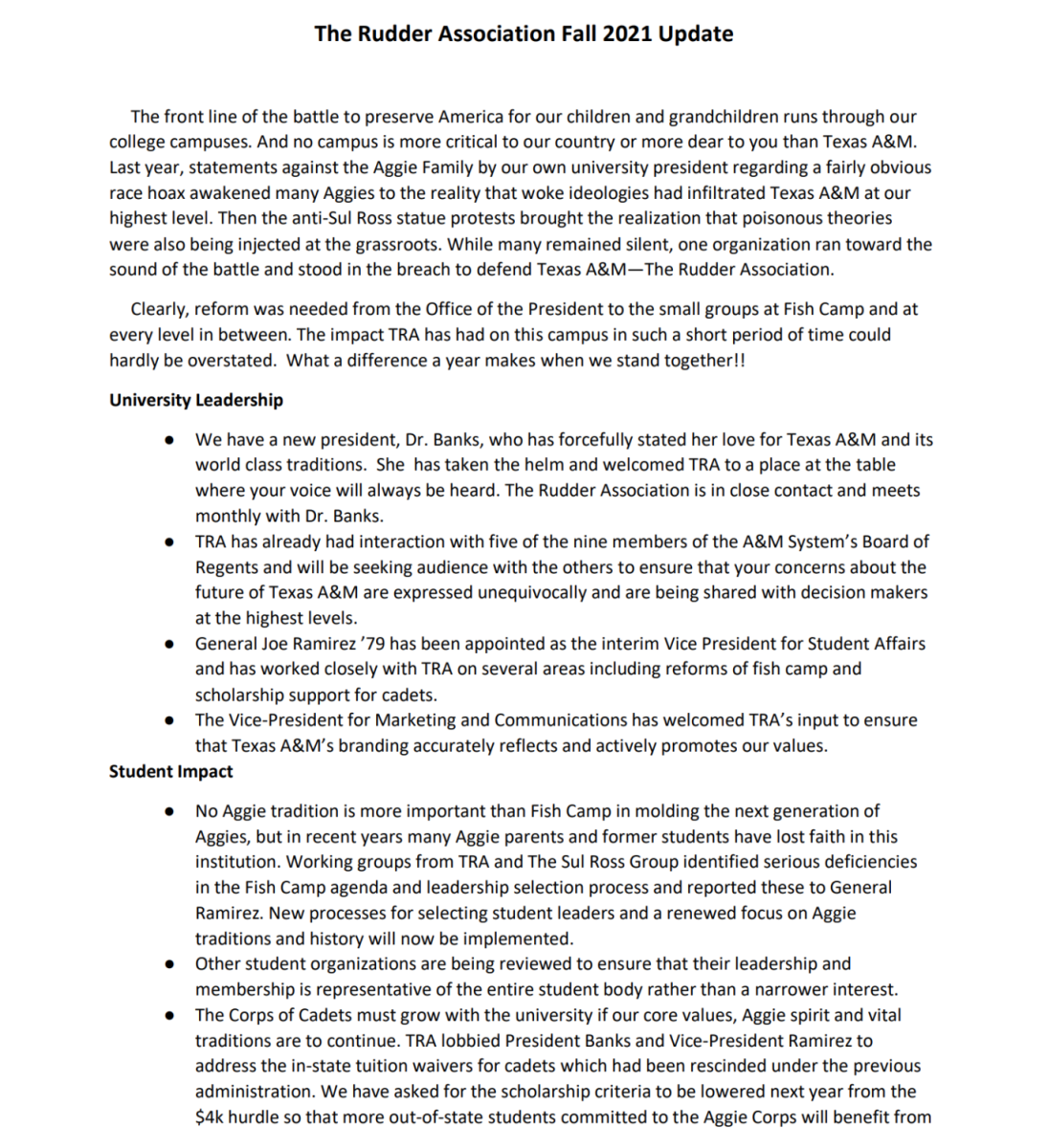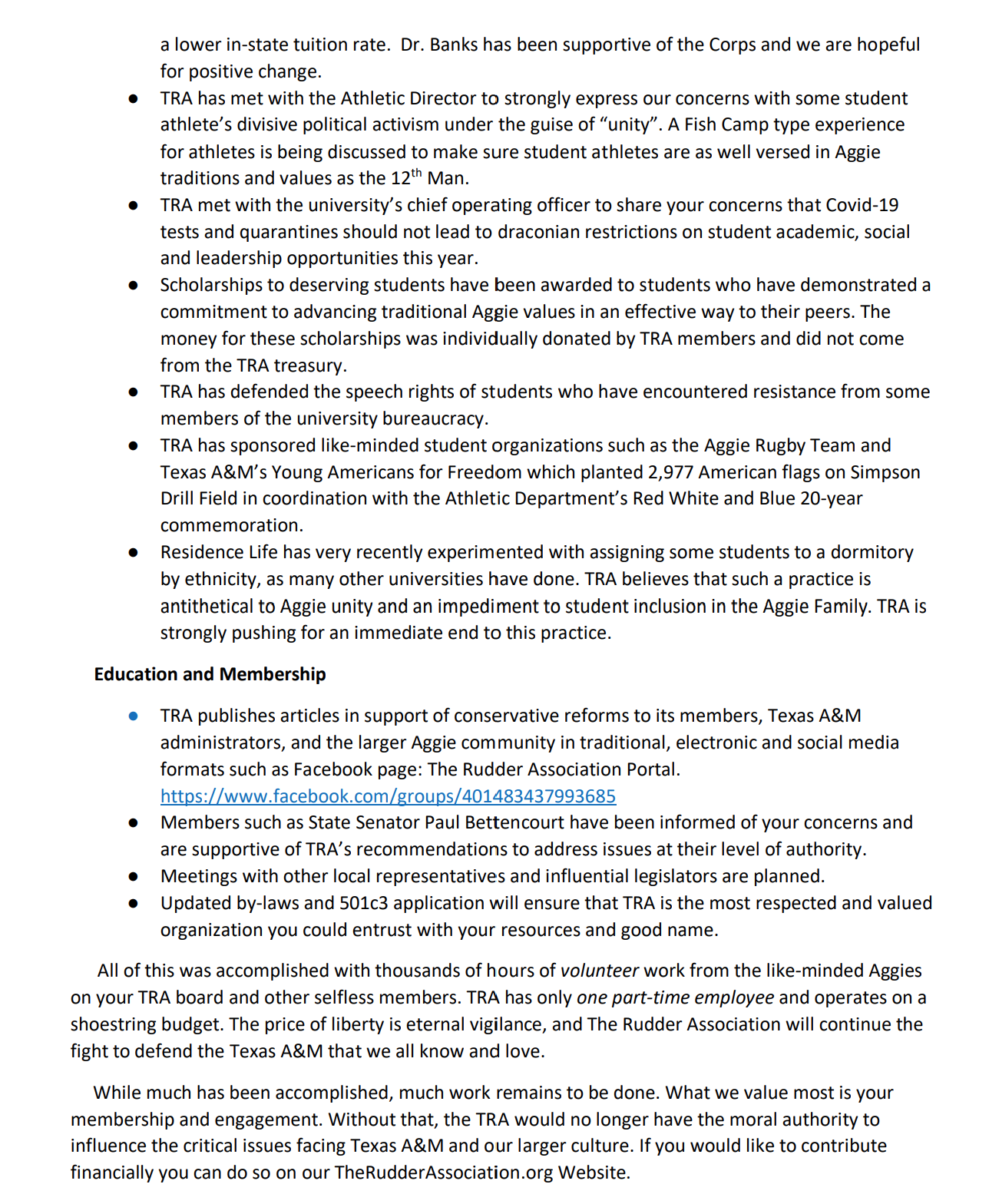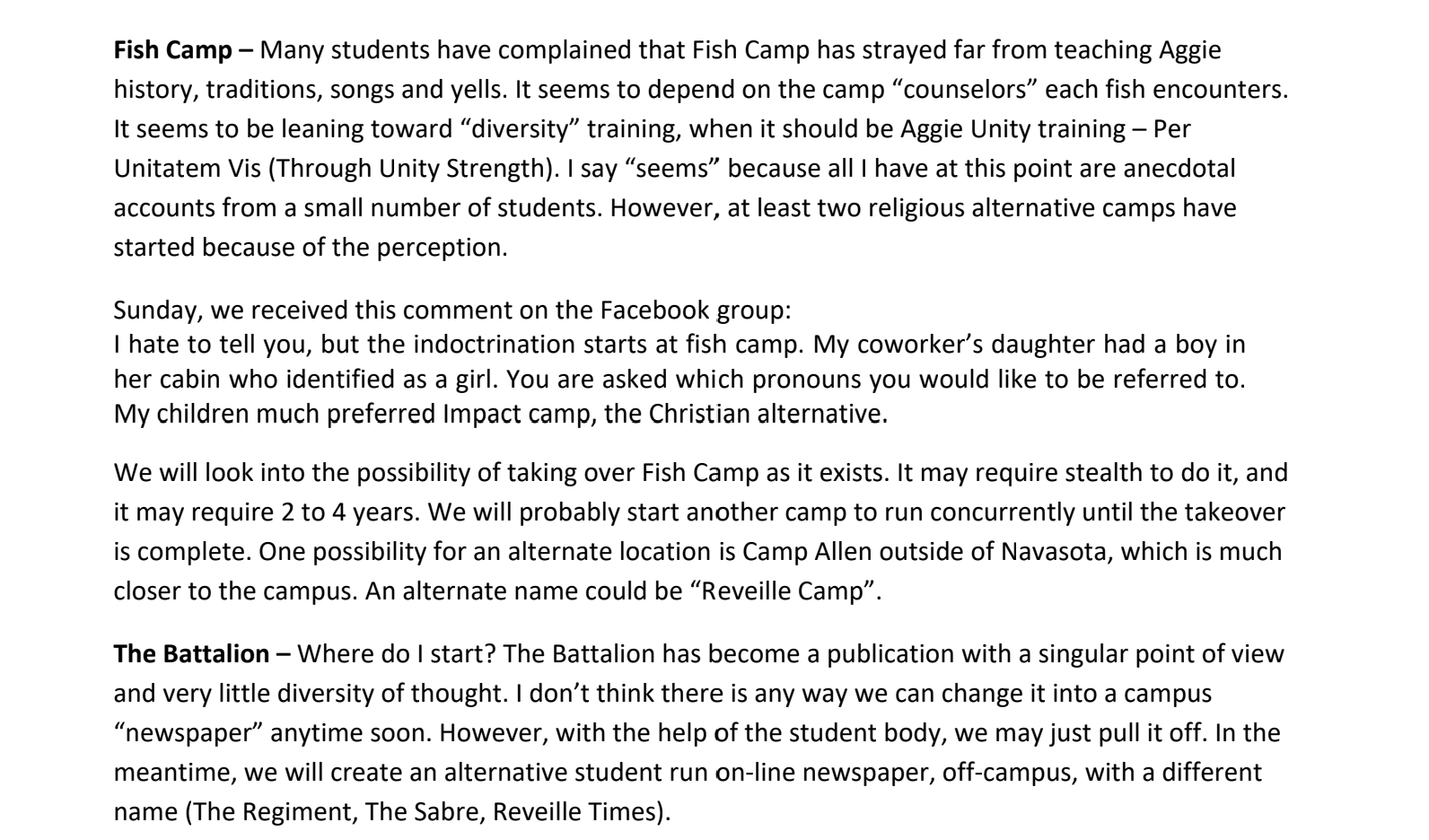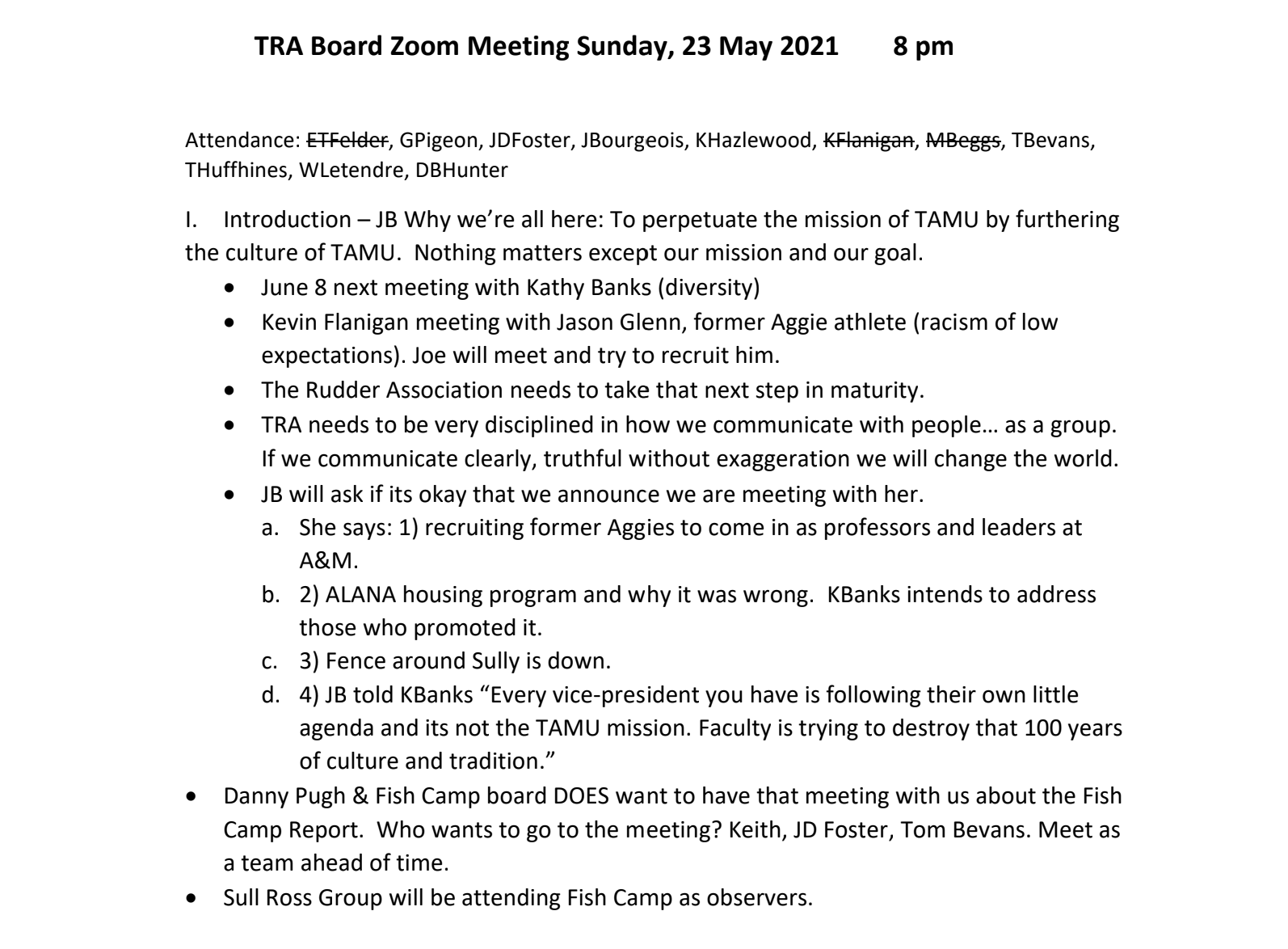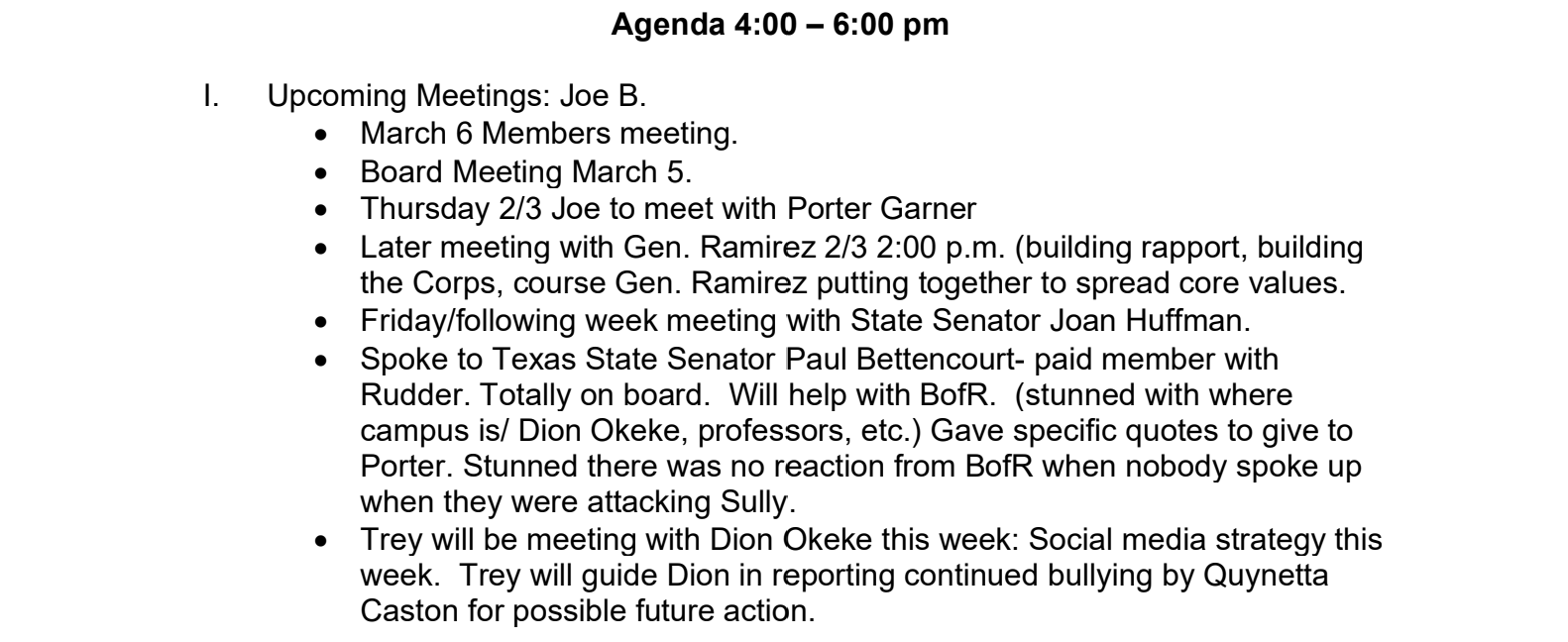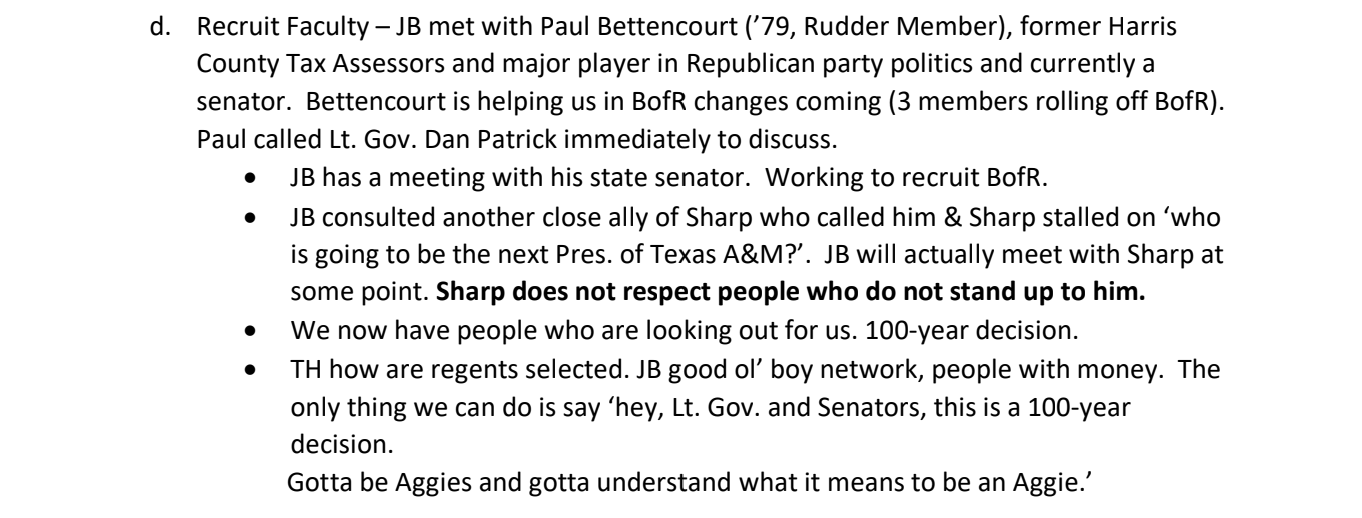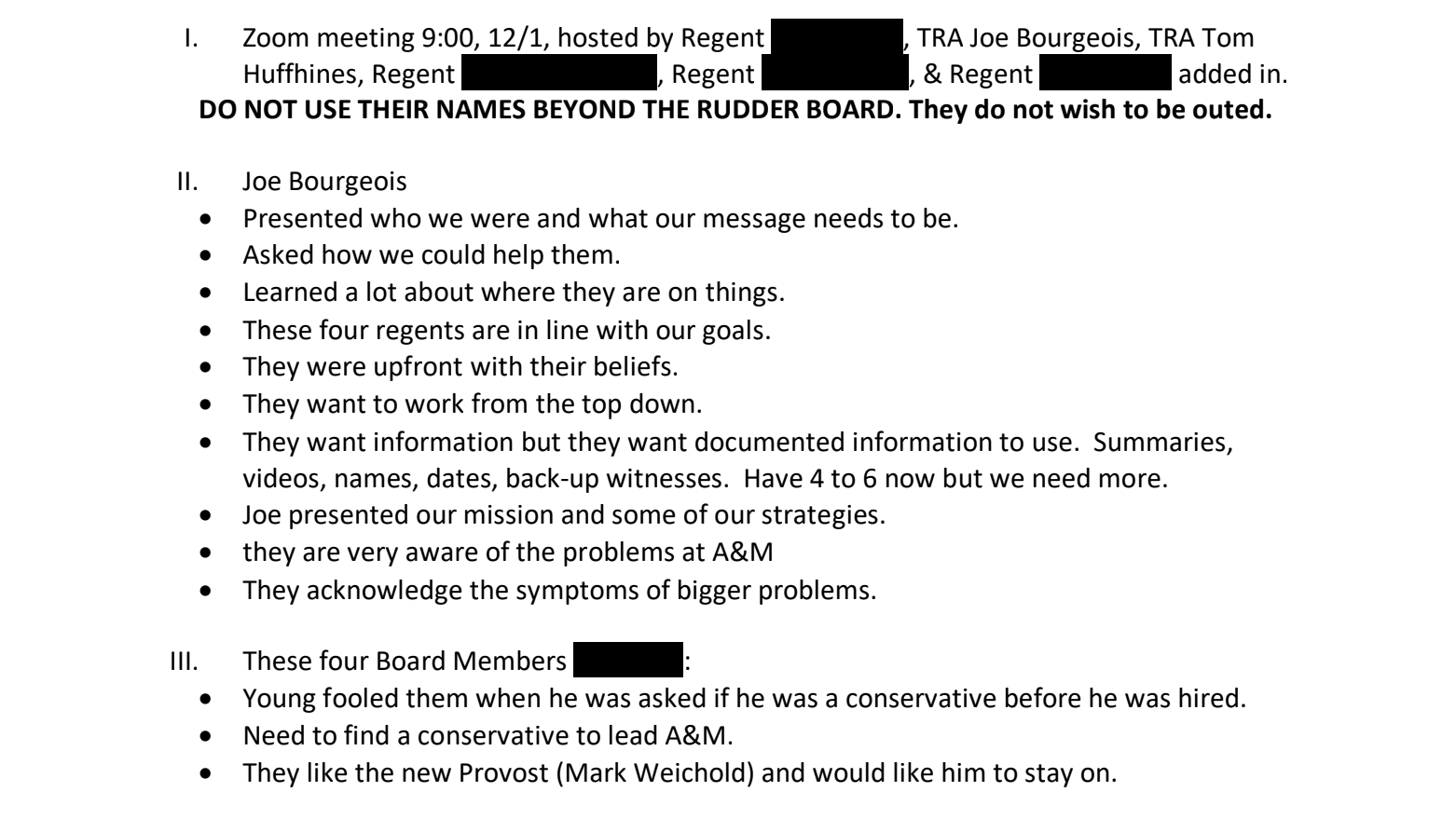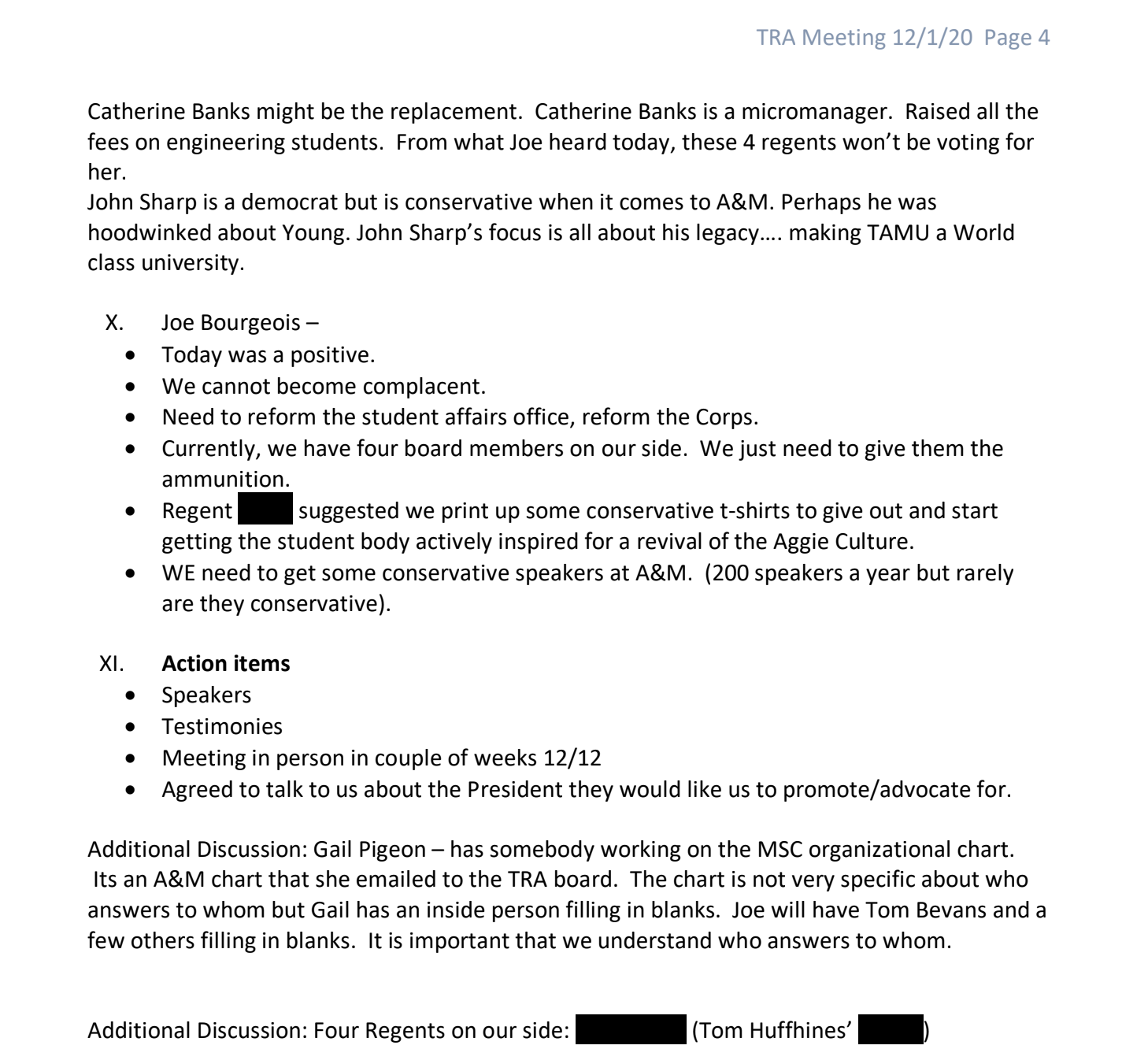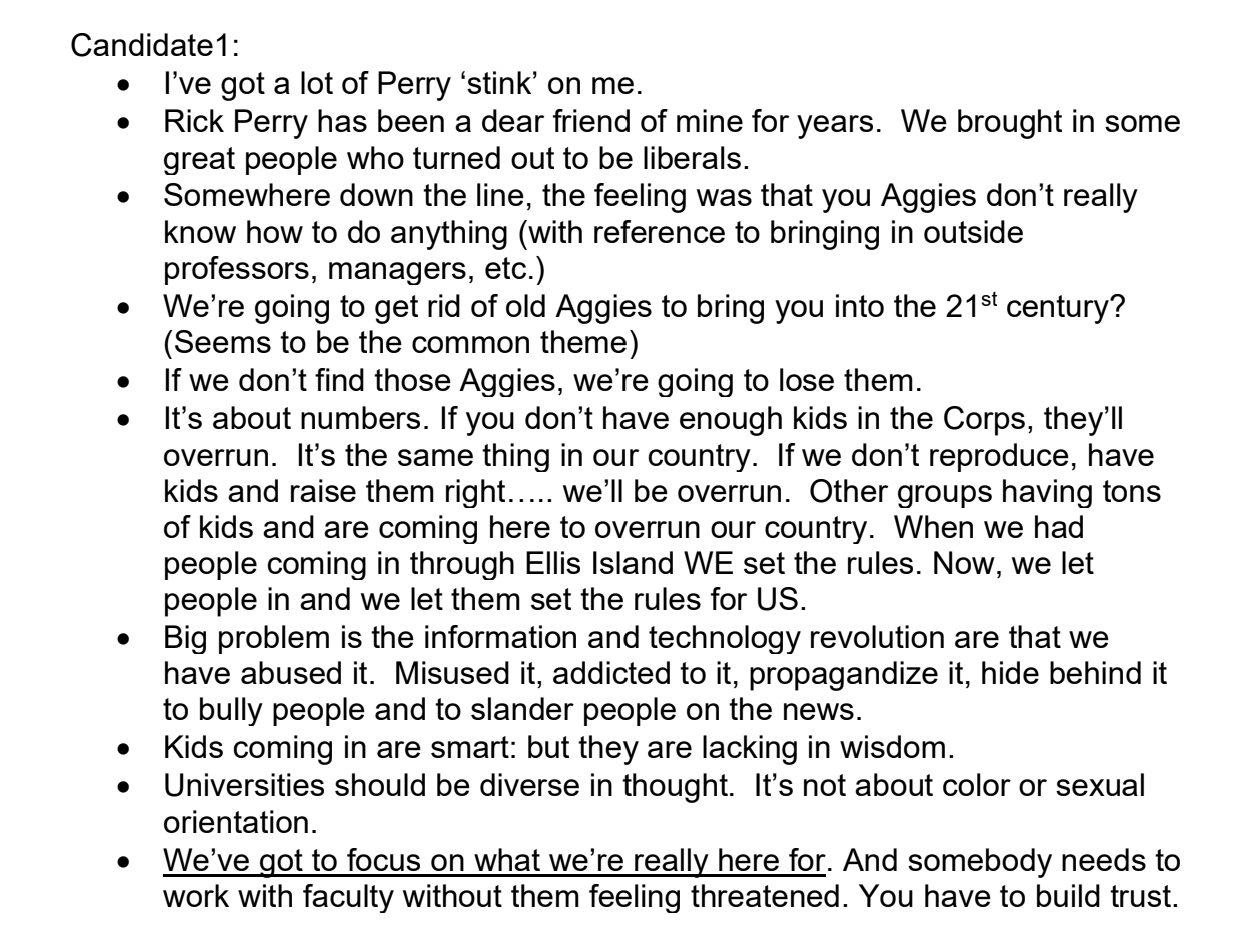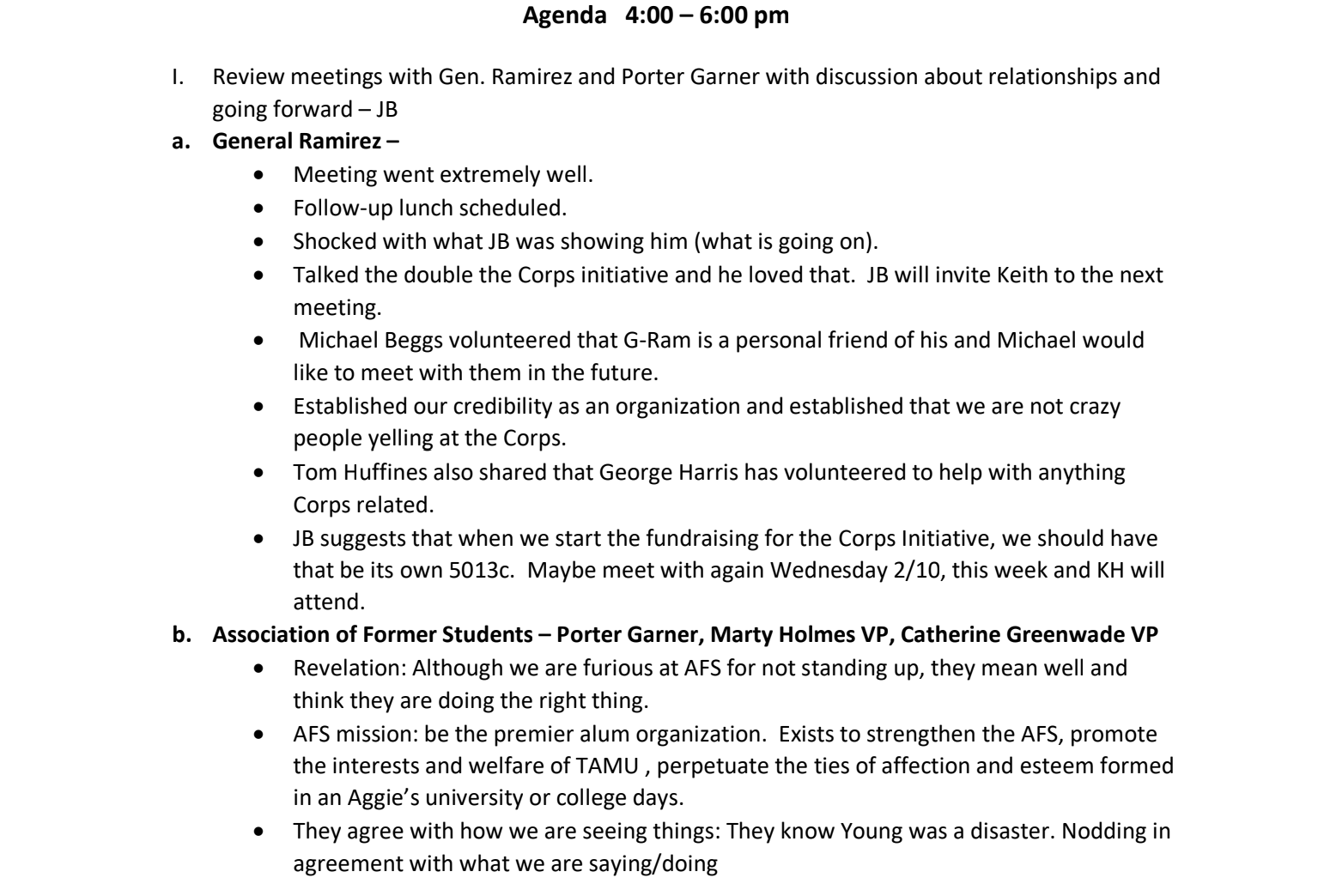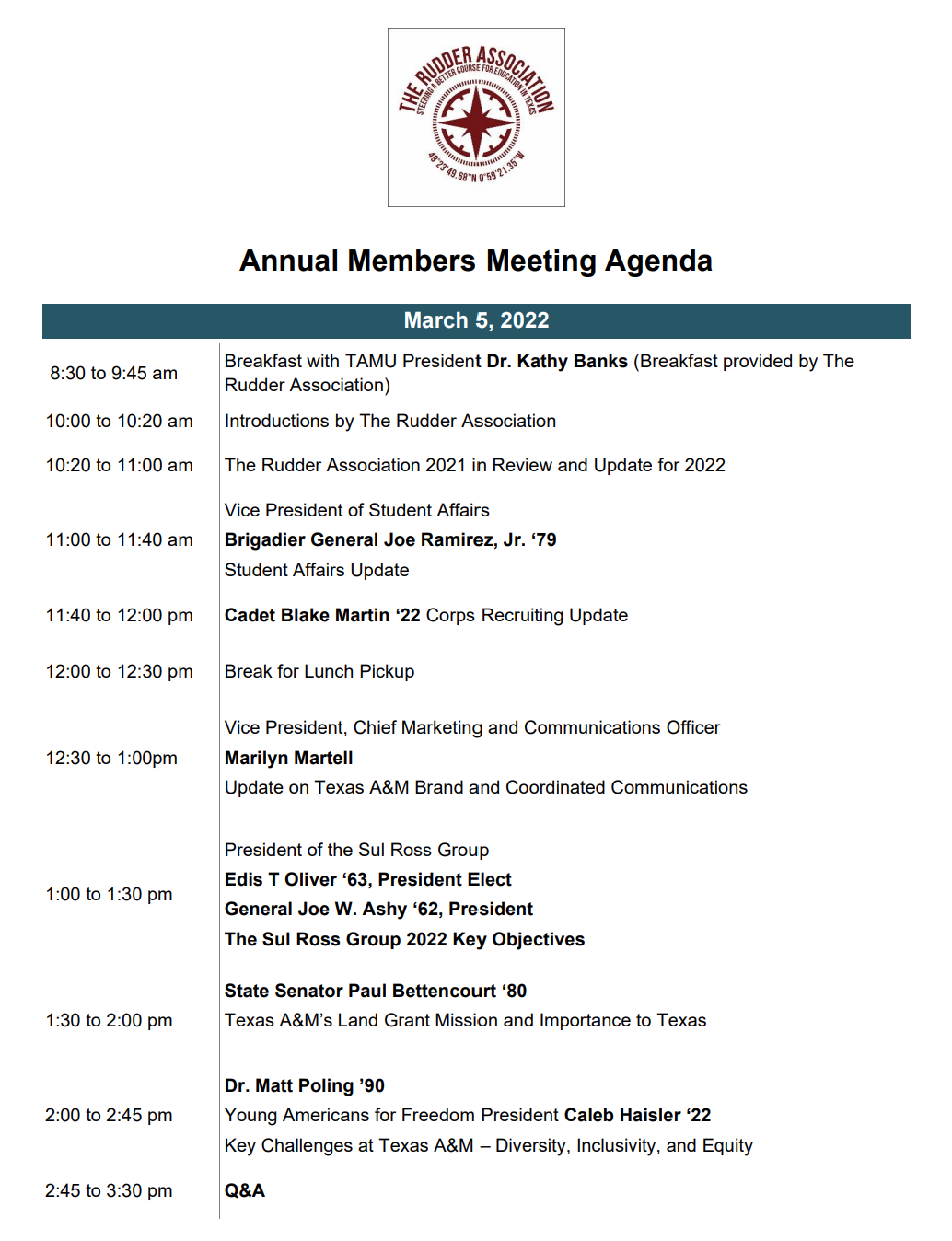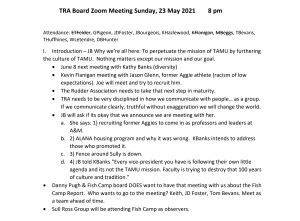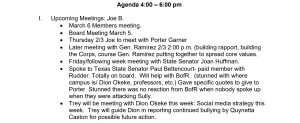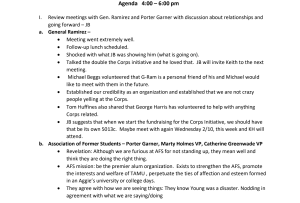Editor’s note: This article was investigated and reported by members of The Battalion’s editorial board: Asst. opinion editor Nathan Varnell, sports editor Casey Stavenhagen, editor-in-chief Myranda Campanella, managing editor Julia Potts, multimedia editor Kyle McClenagan and asst. life & arts editor Caroline Wilburn. It was written by Nathan Varnell and Casey Stavenhagen. The article in no way reflects the personal views of the editors involved. The Battalion follows the Society of Professional Journalists’ Code of Ethics for reporting.
In light of recent administrative decisions, a group of predominantly former students known as The Rudder Association have garnered traction across social media for alleged involvement with the decision making of Texas A&M’s top administrators for the future of A&M.
Several hundred pages of internal documents from The Rudder Association take credit for influence on a wide-variety of policy changes and more than 10 high-ranking A&M System officials, including the Board of Regents, President M. Katherine Banks and multiple sitting state senators sympathetic to TRA causes. However, following an investigation by The Battalion, statements from TRA President Joe Bourgeois, President Banks and Texas Sen. Paul Bettencourt contradict claims originally made in the internal documents.
Since Feb. 14, The Battalion has obtained internal documents from within the Texas-based nonprofit corporation, including meeting minutes, emails, newsletters, budgets and more from sources within The Rudder Association’s private Facebook group and mailing list who chose to remain anonymous. The Battalion has independently verified the origins of the internal documents with the aforementioned sources.
Public comments vs. private newsletters
Internal documents link the origins of The Rudder Association’s actions back to the 2020 protests to remove the Lawrence Sullivan Ross statue in Academic Plaza, according to newsletters dated July to August 2020 and publications in the months since the association was founded on July 15, 2020, by Keith Hazlewood, Class of 1974. Hazlewood was also a prominent member of the counter-protesters, who showed up in support of the Sully statue during the summer of 2020, as reported on by The Battalion.
“The anti-Sul Ross statue protests brought the realization that poisonous theories were also being injected at the grassroots,” the group’s “Fall 2021 Update,” published Oct. 26, 2021, reads. “Clearly, reform was needed from the office of the president to the small groups at Fish Camp and at every level in between.”
In a March 2 interview with The Battalion, Bourgeois, Class of 1989, said The Rudder Association is focused on “bringing Aggies together in a loving way.”
“[Our vision is] for students to have a great education and understand the culture and traditions of A&M,” Bourgeois said.
The association’s website cites its mission “to preserve, protect and perpetuate the Texas Aggie culture, the Spirit of Aggieland and its Core Values and traditions” in order to “put the ‘Aggie’ back in Aggieland.” In an interview with The Battalion, Bourgeois confirmed this to be the association’s mission statement. Bourgeois also said TRA “absolutely” contacts university officials regarding concerns for the future of A&M.
When asked about the influence the association has had on A&M’s campus thus far, Bourgeois said, “I wouldn’t know what kind of impact we’ve had. Yet to be seen, I would say.”
In the association’s Fall 2021 Update and Member Renewal Letter on its website, Bourgeois said, “The impact TRA has had on this campus in such a short period of time could hardly be overstated.” The same document goes on to take credit for a variety of policy changes and relationships built with university leadership.
In the organization’s first newsletter, dated July 9, 2020, Hazlewood’s call to action includes addressing “abusive” professors, Fish Camp, The Battalion and “attacks” by activists and racists.
“We will establish committees for each of the areas we wish to pursue (ex. abusive professors, Fish Camp, destruction of property on campus, attacks on group members by activists and racists, The Battalion),” one item reads.
The specific calls to action had been a theme in newsletters from July to August 2020, with five newsletters sent by Hazlewood. Although less explicit about targets, the stated goal in these newsletters was to take on “entitlement culture.”
“Our plan: Start cleaning up Texas A&M University and then establish chapters at universities and high schools across the state of Texas. We are going to be taking on the ‘entitlement culture’ ideas of those who are rapidly taking over many aspects of our lives,” the group’s first newsletter, dated July 9, 2020, reads.
The precise meaning of “entitlement culture,” or what the association intended to “clean up,” is less clear in Hazlewood’s first newsletter compared to later updates, which explains why TRA chose these targets. One example from “TRA Update 3,” dated July 21, 2020, reads:
“The Rudder Association will work to reverse the cultural trend of radical [extremism] that has taken hold at Texas A&M University.”
Hazlewood echoed this sentiment during an interview with The Battalion on March 2, in which he said critical race theory is dividing campus.
“People want their kids to go to A&M because they think they will be less likely to run into things like being told if you’re white, you’re an oppressor and if you’re Black, you’re oppressed,” Hazlewood said.
Hazlewood’s fourth newsletter, dated July 28, 2020, identified that TRA wanted to create committees for taking action — including on Fish Camp and The Battalion.
“We will look into the possibility of taking over Fish Camp as it exists. It may require stealth to do it, and it may require two to four years. We will probably start another camp to run concurrently until the takeover is complete,” the newsletter reads.
The newsletter described starting an alternative student-run publication with the help of the student body.
“The Battalion has become a publication with a singular point of view and very little diversity of thought. I don’t think there is any way we can change it into a campus ‘newspaper’ anytime soon,” the newsletter reads. “However, with the help of the student body, we may just pull it off. In the meantime, we will create an alternative student-run online newspaper, off-campus, with a different name (The Regiment, The Sabre, Reveille Times).”
Editor’s note: Since the original publication of this piece, the editor-in-chief of independent student publication The Regiment, Dylan Bohn, reached out to The Battalion for comment.
“We are not editorially associated with The Rudder Association, nor are The Regiment’s core values, which promote integrity and free speech,” Bohn said.
In an interview with The Battalion, Bourgeois said the organization is no longer proceeding with these plans to create an alternative student publication and denied rumors that TRA wishes to censor The Battalion.
“We would never censor anybody. We are 100% in support of The Batt as far as First Amendment rights,” Bourgeois said. “I don’t know who came up with the ideas to cancel the paper.”
Bourgeois also cited First Amendment rights as a top priority for TRA and denied other rumors circulating that the association was involved with the cancellation of this year’s Draggieland event.
“We were also accused of trying to get Draggieland canceled. That’s 100% not true,” Bourgeois said.
Bourgeois confirmed that some TRA members did not agree with Draggieland and proposed protesting the event, but he ultimately asked them not to infringe on students’ First Amendment rights. This is confirmed by TRA internal meeting minutes from April 12.
“As president, I stood up and said, ‘We will not protest the Draggieland because, whether we agree with it or not, they have the First Amendment right to expression of their art,’” Bourgeois said in an interview with The Battalion. “The Rudder Association did not protest Draggieland … We would be hypocrites if we were to protest.”
Involvement with A&M administrators, regents
At the time of the aforementioned July 28, 2020, update on committees, TRA already had a small board of directors and was filing to become a registered domestic nonprofit corporation.
To achieve its goals for the future of A&M, meeting minutes from November 2020 detail the group’s first documented efforts to establish relationships with key decision-makers, including A&M Board of Regents and Association of Former Students President and CEO Porter Garner.
“[The] plan is to build rapport, get to know them, ask for a follow-up meeting. Don’t want to scare them away. We have to be very careful how we enlighten them. Need testimonials to break through and reach them,” the Nov. 15, 2020, minutes read. “Systemic prejudices against conservative students. Current student sentiment: If you believe in any traditions at A&M, you are automatically racist. We have to make a connection with administrators at A&M.”
In an interview with The Battalion, Association of Former Students assistant Vice President for Communications Scot Walker said Garner did meet with Bourgeois but declined to comment on the subject matter discussed.
“Mr. Garner, and everyone at the Association [of Former Students], are always willing and eager to listen to the concerns of former students who have a broad range of diverse opinions, and we share those with the university leadership. It would not be appropriate to get into the private discussions,” Walker said.
Garner could not be reached for comment at the time of publication.
The internal meeting minutes from June 7, 2021, and the Fall 2021 Update both state Banks meets monthly with TRA board members to hear their visions for A&M. In an interview with The Battalion, Bourgeois said he has only met with Banks “four or five times,” in both official and unofficial capacities. Banks could not be reached for comment at time of publication, but associate Vice President for Marketing & Communications Kelly Brown confirmed on behalf of the president that Banks officially met with Bourgeois on Oct. 28, 2021, and Feb. 2 of this year. The documents noted at least two additional meetings on April 15, 2021, and June 8, 2021.
“Like all good leaders, President Banks accepts invitations to meet with people — individuals, small groups, large groups — who represent a multitude of interests,” Brown said in a comment to The Battalion. “President Banks doesn’t make decisions based on anything other than what is in the best interest of Texas A&M University.”
The July 12, 2021, meeting minutes state Banks told Bourgeois that TRA’s “voice is being heard.” The Oct. 26, 2021, fall update additionally states, “She has taken the helm and welcomed TRA to a place at the table where your voice will always be heard. The Rudder Association is in close contact and meets monthly with Dr. Banks.”
The May 23, 2021, minutes also state Banks took action on a concern Bourgeois raised on behalf of TRA. Banks spoke on three issues to Bourgeois, according to the minutes, but in particular about the AALANA Living Learning Community under the Department of Residence Life. In minutes from Feb. 6 and Feb. 21, 2021, TRA board members were noted to describe this program as a form of “segregation” because it groups roommates according to their racial and ethnic identity. The Residence Life website for the community describes it as follows:
“AALANA offers a space for shared cultural experience and the opportunity to build a stronger sense of community among students of color within and across the different communities represented in the AALANA LLC,” the page reads.
Banks evidently discussed with Bourgeois why this program was “wrong,” according to the minutes, and told Bourgeois she intended “to address those who promoted it” following her meeting with Bourgeois.
According to the internal documents reviewed by The Battalion, Bourgeois also meets frequently with Vice President for Student Affairs, or VPSA, Gen. Joe Ramirez. Bourgeois confirmed in an interview with The Battalion that his conversations with Ramirez date back to the general’s time as commandant of the Corps of Cadets, and they would frequently discuss visions for the university and the Corps. Ramirez confirmed meetings with TRA in a comment to The Battalion.
“As the VPSA, I speak to a number of organizations both on and off campus on a daily basis,” Ramirez said. “The last time I talked to the Rudder Association was last March at their annual meeting. As the Commandant of Cadets at the time, I was invited to provide an update on the Corps of Cadets, which I did. The Rudder Association is interested in helping to grow the Corps of Cadets, which I support.”
According to the Oct. 26, 2021, fall update, the group states, “General Joe Ramirez ’79 has been appointed as the interim Vice President for Student Affairs and has worked closely with TRA on several areas including reforms of Fish Camp and scholarship support for cadets.”
Ramirez was not appointed as interim VPSA until June 3, 2021, nor officially as VPSA until Dec. 17, 2021, approximately three months after the annual meeting Ramirez said he attended, according to Texas A&M Today. It is unclear if, or when, Ramirez “worked closely” or met with TRA since his appointment in an official capacity.
Bourgeois additionally told The Battalion he has been in conversations with dues-paying TRA member state Sen. Paul Bettencourt (R-Houston).
“Not meetings, no. I have talked to my state legislators, you know, via the phone and text. But, I’ve never met with them in person,” Bourgeois said.
Bourgeois later clarified he does not currently reside in Bettencourt’s representative district, but was represented by him when Bettencourt served as Harris County tax assessor collector and as his Republican party chairman.
According to the internal minutes of TRA’s Jan. 31 and Feb. 6, 2021, board of directors meetings, Bettencourt spoke with Texas Lt. Gov. Dan Patrick about TRA’s concerns with A&M. The minutes also document conversations that outline an effort to influence Banks’ appointment as university president as well as the appointments of new members of the Board of Regents.
“[Bourgeois] met with Paul Bettencourt (’79, Rudder member), former Harris County Tax Assessor and major player in Republican party politics and currently a [state] senator. Bettencourt is helping us in BofR [Board of Regents] changes coming (three members rolling off BofR). Paul called Lt. Gov. Dan Patrick immediately to discuss,” the Feb. 6 meeting minutes read.
In an interview with The Battalion, Bourgeois said, “I don’t know whether [Bettencourt did call Patrick] or not; I wasn’t there, so I don’t know. I was just concerned about who they were nominating for regents and frankly just wanted a good Ag, somebody that actually understood A&M.”
Bettencourt confirmed in an interview with The Battalion he did discuss Banks’ appointment with Bourgeois and said he “probably did” discuss it with Lt. Gov. Patrick because of previous work together on the RELLIS campus.
“I did talk to Joe about Kathy Banks’ appointment,” Bettencourt said. “I specifically told Joe that I had a long-term history with Kathy Banks and Chancellor [John] Sharp when we, along with Patrick, got the money for the RELLIS lab approved … I encouraged Joe that Kathy Banks would be a good president selection at that time. Lt. Gov. Patrick already had a favorable opinion of Kathy Banks.”
Bettencourt said he could not recall passing messages to Patrick on TRA’s recommendations for Board of Regents appointees who aligned with the association’s views of A&M, despite the statements in the Feb. 6 minutes.
The Rudder Association’s first efforts regarding the Board of Regents were to meet with the regents personally. According to meeting minutes from Dec. 1, 2020, the Rudder Association secured the attendance of four members of the A&M System Board of Regents. The meeting minutes obtained by The Battalion were censored by TRA to remove the names of the regents in the meeting as well as other “highly sensitive information.”
“DO NOT USE THEIR NAMES BEYOND THE RUDDER BOARD. They do not wish to be outed,” the minutes read on the regents in attendance.
Further examination by The Battalion revealed, however, that the censored text could be copied and pasted into a text document to be viewed in its entirety due to TRA using a digital black highlighter to censor. Following quotes are from the uncensored text.
The regents in attendance were Regent Michael J. Plank, Regent Mike Hernandez, Regent Cliff Thomas and former-Regent Phil Adams. The meeting was hosted by Bourgeois and TRA board member Tom Huffhines, who is later noted as Regent Plank’s cousin and a key point of contact to the regents.
Some initial notes from Bourgeois in the minutes state, “These four regents are in line with our goals. They were upfront with their beliefs. They want to work from the top down. They are very aware of the problems at A&M. They acknowledge the symptoms of bigger problems.”
Former A&M President Michael K. Young is a topic of discussion across multiple TRA documents, often for actions taken or not taken during the protests against the Ross statue on A&M’s campus. When mentioning Young, the minutes read as follows:
“These four Board Members admitted:
• Young fooled them when he was asked if he was a conservative before he was hired.
• Need to find a conservative to lead A&M.
• They like the new Provost (Mark Weichold) and would like him to stay on.”
Regent Plank is referenced, having told Huffhines over a phone call that another regent, Jay Graham, was “wishy-washy,” and although not an outspoken conservative, would go “with the group.” The notes continued to describe possible avenues for approaching Graham and other regents with TRA’s concerns and goals.
Regents Robert L. Albritton, Phil Adams and Bill Mahomes were the regents who TRA believed would “roll off” in 2021, prompting the aforementioned appointments that TRA sought to influence through the lieutenant governor and state senators. On Albritton and Mahomes, the minutes stated the following:
“Albritton is a troublemaker, and fellow regents have written several letters to the [governor] asking that he be removed. Mahomes is a good guy. He’s the first black member of the Corps of Cadets ’69. Mahomes told [Plank] that Sully should STAY.”
Throughout the meeting minutes and other internal documents, Regent Plank appears as active in providing input to TRA. In the Dec. 1 meeting with the regents, Plank suggested TRA “print up some conservative t-shirts to give out and start getting the student body actively inspired for a revival of the Aggie Culture.”
In the prior Nov. 24 minutes, Plank pitched an idea to “get conservative speakers signed up for as many speaker slots as possible in order to minimize slots for liberal speakers on campus.” It is unclear from the documents if the statement meant speakers at certain meetings or speakers at the university who have appeared over the past year, such as former Vice President Mike Pence, Rep. Dan Crenshaw (R-Houston) and conservative commentators Steven Crowder, Michael Knowles and Matt Walsh, as reported on by The Battalion.
Plank, Hernandez and Thomas could not be reached for comment.
By the time of an email newsletter dated July 5, 2021, received by a source within TRA, the group had “met with 80% of the Texas A&M Board of Regents.”
In several documents, The Rudder Association proposed nominating one of their own for membership for the Board of Regents. One name proposed in the Nov. 24 minutes was TRA board member Matt Poling. It is unclear whether TRA ultimately provided input to the governor’s office on the new appointments, but the official appointees became Albritton and Mahomes for new terms and new member James R. “Randy” Brooks in April of 2021, according to the Office of the Texas Governor.
The same November 2021 internal meeting minutes note Banks to be in the conversation to become A&M’s next president, following Young. However, Banks was noted to be “a micromanager,” according to the minutes.
Before Banks’ appointment in March 2021, TRA secured a meeting with another potential candidate for A&M president, Lt. Gen. Joseph Weber. A former vice president for Student Affairs at A&M from 2008-14, TRA met with him on Sunday, Jan. 17 at 2 p.m., according to uncensored meeting minutes.
Although Weber did not become the president of A&M, he did provide input on several TRA proposals, according to the Jan. 17 minutes. One such proposal was to then-Commandant of the Corps of Cadets Ramirez, drafted as “Double the Corps in Four” as an attachment to later documents, which sets forth a four-year pilot program funded by The Rudder Association to utilize paid recruiters and the Aggie Network to increase the recruitment and retention of cadets.
Bourgeois asked Weber about the subject and the idea of an endowment for growing the Corps, where TRA would cover the room and board of a cadet’s first year. Weber stated his approval, according to the minutes. However, Weber also provided more reasoning to TRA on the importance of a large Corps. Weber’s statements are not expressly representative of The Rudder Association’s board of directors and are not acknowledged any further within the minutes.
“It’s about numbers,” Weber is quoted by the minutes. “If you don’t have enough kids in the Corps, they’ll overrun. It’s the same thing in our country. If we don’t reproduce, have kids and raise them right … we’ll be overrun. Other groups having tons of kids and are coming here to overrun our country. When we had people coming in through Ellis Island WE set the rules. Now, we let people in and we let them set the rules for [the] U.S.”
The Rudder Association proposed the Corps program to Ramirez in his first documented meeting with Bourgeois, Feb. 3, 2021, at 2 p.m. Documented in the Feb. 6, 2021, minutes, Bourgeois is noted to have said the meeting “went extremely well,” and that Ramirez was “shocked” with what Bourgeois showed him. The two discussed the Double the Corps initiative and Ramirez “loved that.” Bourgeois believed TRA had established its credibility as an organization with Ramirez following the meeting, and in the meeting notes stated that a future meeting was scheduled and Hazlewood would be invited to it.
The meeting with Ramirez was the first of several interactions documented by The Rudder Association, and one of many meetings occurring within the same month timespan that established key relationships for the group.
Fish Camp
While corresponding with soon-to-be VPSA Ramirez, TRA was still in contact with then-VPSA Daniel Pugh, who had discussed Fish Camp with TRA across multiple months, according to the meeting minutes. The association developed a committee in 2020 dedicated to researching Fish Camp and drafting a report on perceived problems, which had produced a report, authored by TRA private Facebook group admins Becka Walker Byrd and Holly Walker Porter, by April 12, 2021. Porter declined to comment on the record; Byrd could not be reached for comment.
While the report was ongoing, Hazlewood met with Pugh at Pugh’s home on Wednesday, March 10, 2021, according to the minutes of that day. The meeting on Fish Camp occurred just over a month after The Battalion reported on sexual assault and harrassment within Fish Camp.
Hazlewood wanted to give the TRA Fish Camp Report to Pugh, but Pugh suggested it be given to the student leaders who run Fish Camp, who, in March of 2021, still maintained complete control of executive decisions, leadership selection and policy changes, unlike during the 2021-22 academic year.
According to the meeting minutes from March 14, Walker Porter said, “Very concerned that Danny Pugh wants this to go to the students. There is no oversight whatsoever. Shocked that the university does not have more oversight. Inmates running the asylum.”
Former VPSA Pugh confirmed in an interview with The Battalion that he did meet with TRA members to discuss their concerns over Fish Camp, but he ultimately directed them to talk to the student leadership.
“The beauty of this campus is that it’s student-run and student-led, right? And that’s always been why it’s the largest in student leadership for the country,” Pugh said. “So, if you want to critique them, then you should sit with them. But they never reached out to Fish Camp leadership at all.”
Pugh said in his later conversations with Hazlewood, when Hazlewood mentioned TRA was drafting a report on Fish Camp, he directed TRA to look at the publicly available evaluations done every year about Fish Camp through Student Life Studies. Pugh also mentioned how the retention rates for students who attended Fish Camp were approximately 95% when he was VPSA.
“I asked them if they had ever gone and looked at the publicly available surveys done every year about Fish Camp, and they said no,” Pugh said in an interview. “I sent them to the links for those sites and said, ‘Look, if you’re going to do a report on Fish Camp then you need to listen to the students completing the evaluations.’ I don’t know if they ever did it or not; it was really the last I heard of them.”
On Fish Camp, “TRA Update 4” reads, “It seems to be leaning toward ‘diversity’ training, when it should be Aggie Unity training — Per Unitatem Vis (Through Unity Strength). I say ‘seems’ because all I have at this point are anecdotal accounts from a small number of students. However, at least two religious alternative camps have started because of the perception.”
Hazlewood goes on in the newsletter to reference a comment made in the private Rudder Association Facebook group, in which a parent states, “The indoctrination begins at Fish Camp.” The parent described their grievance, referencing a coworker’s daughter who had “a boy in her cabin who identified as a girl,” and that counselors asked campers their preferred pronouns. Following, Hazlewood describes TRA’s aforementioned plan of action to either take over Fish Camp or start an alternative camp within the next two to four years.
During his March 2 interview with The Battalion, Hazlewood said these comments from “about 50” concerned parents and students caused him to want to take action.
“It’s not Fish Camp — it’s gay camp, or it’s critical race theory camp,” Hazlewood said. “But it ain’t supposed to be gay camp. It’s supposed to be learning about being a Texas Aggie. They were teaching the stuff about white privilege and, you know, white people were the oppressor and Black people were the oppressed.”
Hazlewood has no longer been affiliated with TRA since a schism in July 2021, he said.
When asked about certain parents’ feelings toward Fish Camp as “gay camp” or “critical race theory camp,” Mikayla Slaydon, Fish Camp’s current head director, said in an interview with The Battalion that the camp’s ultimate goal is to foster a universally-accepting environment for all incoming freshmen.
“The purpose of Fish Camp is to make sure that all freshmen are welcome, and we aim to transition the incoming freshman class as diverse as they are. We have a lot of programs and a lot of training curriculums that surround tradition and surround what we stand for as a university,” Slaydon said. “Encouragement of any form toward any identity is not encouraged.”
Bourgeois, who was selected to be a Fish Camp namesake for the summer of 2021, said he saw an inconsistency among the camps at his session with their balance of conversations surrounding A&M traditions, academics and social acclimation.
“Some camps focus more on the traditions and the culture, some camps focus more on the social engagement, some camps focused on the academics, but it wasn’t consistent,” Bourgeois said.
Bourgeois said he did meet with Ramirez to discuss his thoughts on the running of Fish Camp after seeing it first hand, but he denied ever discussing Fish Camp’s values, which during the summer of 2021 included “diversity.”
“Gen. Ramirez asked me specifically what I thought about Fish Camp because I was a namesake,” Bourgeois said. “I happened to be a namesake, which had nothing to do with The Rudder Association.”
Ramirez confirmed this conversation in a comment to The Battalion.
“When I met with [Bourgeois] briefly last summer, I asked him how he enjoyed his experience at Fish Camp,” Ramirez said. “I did the same with every Fish Camp namesake and many of the Fish Camp counselors and attendees that I met last summer, both at Fish Camp and afterward.”
As previously reported on by The Battalion, Banks said Fish Camp’s values were changed simply to align them with the university’s Core Values. Ramirez publicly apologized for leaving student leaders out of that decision, among others, in a Feb. 21 university-wide email.
“We received instruction from administration that the transition from Fish Camp values to the Core Values at Texas A&M was to make sure that — because we are students’ first impression of campus and what A&M stands for — that we should be aligned with the Core Values of the university to make sure we are sending the same message to freshmen from all the points they receive when they first come here,” head director Slaydon said.
Since 2020, The Rudder Association has claimed in its internal documents to have met with several administrators at A&M, including Vice President and Chief Marketing & Communications Officer Marilyn Martell and Chief Operating Officer Greg Hartman, in addition to the aforementioned university President Banks, VPSA Ramirez and Association President Garner. Martell confirmed these meetings on the record, while Hartman said he could not recall for sure if he met with TRA representatives, though both noted it is their job to meet with groups, including former students, on the status of the university.
Martell and Ramirez, in addition to state Sen. Bettencourt, were scheduled to speak at TRA’s 2022 annual meeting on March 5, according to the internal meeting notes reviewed by The Battalion. Banks was originally scheduled to attend, though Bourgeois said in an interview with The Battalion she had to cancel due to a prior engagement.




